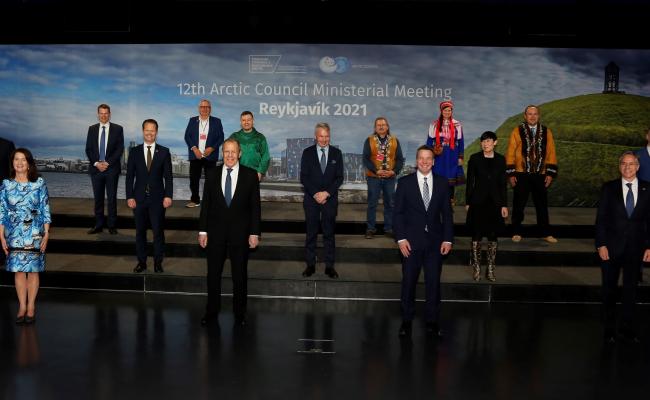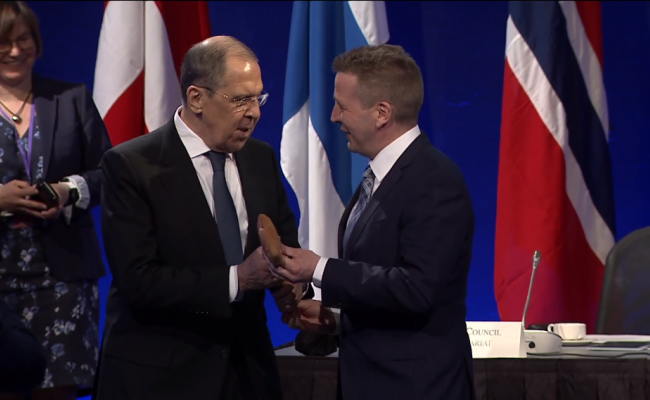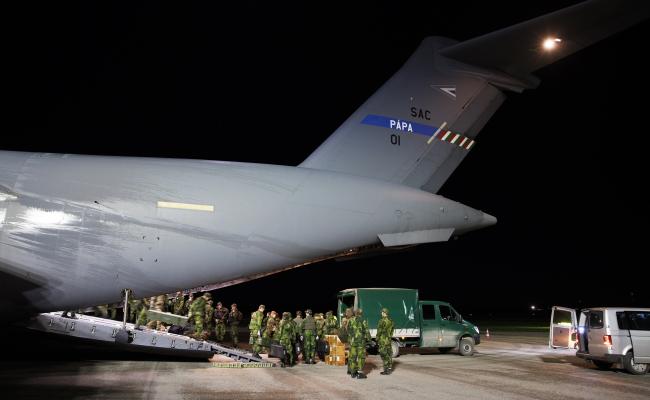Hard Security Focus May Once Again Come to Dominate the Arctic, Researcher Fears
Research Professor Timo Koivurova at the University of Lapland, Finland visited the High North Center at Nord University recently, sharing his thoughts on what consequences the war in Ukraine may have for joint governance and management in the Arctic. (Photo: Trine Jonassen)
Arctic cooperation may still survive the Ukraine crisis, however, it can nevertheless be overshadowed by the emphasis on military security, which ruled the ground during the Cold War, Finnish Professor Timo Koivurova points out.
“I fear that the hard security view on the Arctic will gain ground. In that case, we are returning to the days of the Cold War and will emphasize counting troops and focusing on military capacities and strategies in the Arctic region”, Timo Koivurova says to High North News.
Koivurova is a Research Professor at the Finnish University of Lapland’s Arctic Center. He is also a former director of the center and was advisor to the Finnish chairmanship of the Arctic Council in 2017-2019.
Responding to the Russian war in Ukraine, cooperation in the Arctic Council, which was established in 1996, was put on hold early March – for the first time ever.
The Council has been characterized by its ability to keep conflicts from other areas, including the one related to Ukraine from 2014, at arm’s distance. Military security is also clearly excluded from the Council’s mandate.
The weight of cooperation is at stake
Later this month, Russia was also suspended from activities in the Barents cooperation, which has been going on since 1993.
“Now, I am sure diplomats are trying to create a space for Russia to return and, after some time, perhaps some cooperation with the Russian side may continue”, the Finnish researcher says and continues:
“However, even if Arctic cooperation such as within the Arctic Council and the Barents cooperation were to be resumed at some point, I fear that its significance will be reduced. This is so because the main focus then is likely to be on military security issues.”
“It is now fair to say that Western states are consolidating their military resources and that they are doing so with Russia in mind”, he adds.
This may knock the air out of important cooperation between the Arctic states, such as in the field of climate.
Climate threat taking the back seat?
The overall relationship between the West and Russia has deteriorated over many years, in particular following the Russian annexation of Crimea in 2014.
During the same period, the Arctic areas have also become increasingly characterized by gradual re-militarization and more military exercise activities both on the Russian and the western side. Parts of this activity can be tied to colder fronts between the East and the West.
Arctic cooperation dialogue has worked so far, despite the increasing military dynamic as well as security policy tensions between Russia and the West and lack of trust from various conflict areas.
Koivurova points out that a return to the Cold War framework for the Arctic is not inevitable, however, he is now worried about it.
“Nevertheless, everyone who now think about Arctic issues have to take into consideration that we may be heading towards a world characterized by geopolitics and military-strategic calculations. This may knock the air out of important cooperation between the Arctic states, such as in the field of climate.”
“In my view, climate change is by far the largest security threat in the Arctic, as there are no genuine conflict drivers in the region itself.”
The professor points out that most Arctic sovereignty issues have been decided on. He also refers to Russia having a quite different relationship with Ukraine than with its Arctic neighbors and relates differently to them, for starters.
“Now, however, images from the war rules the ground along with emotion-based opinions, which are also marked by a complete distrust in Russia.”
In the Council, trust is built on a continual basis and efforts are made to frame the Arctic as a region with peaceful interaction.
Nominated for Nobel’s Peace Prize
Late January, the Arctic Council was nominated for the Nobel Peace Prize by four Norwegian MP’s. They referred to the Council’s cooperation as exceptional in international politics and illustrative for what the world needs more of.
At the time, military analyst Jonas Kjellén feared that the Ukraine conflict would spill over into the Arctic cooperation.
One of the MP’s behind the nomination, Bård Ludvig Thorheim (Conservatives), on the other hand, expressed hope that the Arctic Council could have a positive spillover effect towards the Ukraine conflict.
Now that the war is ongoing, one may perhaps imagine that maintaining this arena for cooperation can contribute to balancing the security policy ice front through restoring some trust and preventing the spread of armed conflict.
Trust and peacebuilding potential
Koivurova argues that the Council is a clearly trust-building forum and a counterweight to the voices arguing for an overtly hard security agenda.
“The Arctic Council is a dialogue forum and has been considered an arena contributing to peace and stability. In many of the Council’s working groups there is continual cooperation between people from the various countries, and representatives also meet on ambassador and foreign minister levels.“
“Trust is built on an ongoing basis in the Council and efforts are made to frame the Arctics as a region of peaceful interaction, versus those who are wearing geopolitical glasses and focus on military conditions in the region”, he continues.
“Following the Russian annexation of Crimea, the Arctic Council and the Barents Council were the only forums in which the Arctic foreign ministers met. During tense times, having platforms for meeting and discussing various issues is good, one in which foreign ministers get to know each other on a personal level, which is important. At present, these meeting places are lacking.”
Half the Arctic is Russian and the most important work the Arctic Council has produced in the field of climate has happened in Northwestern Russia.
Consequences of a potential long-lasting breach
One may imagine circumpolar Arctic cooperation continuing without Russia in an “Arctic seven format”, either through the country’s being directly suspended or through its not wanting to return to the Arctic Council.
What are the possible consequences of a potentially long-lasting continuation without Russia?
“Half the Arctic is Russian and the most important work the Arctic Council has produced in the field of climate has happened in Northwestern Russia. The key Arctic emission sources for climate gases, black carbon and other substances are localized there”, the professor answers and expands:
“The Council has been able to facilitate cooperation that has produced actual results. The relevant industries in question in this area have grown more environmentally friendly.”
Koivurova stresses that it is important to emphasize the climate threat as all the Arctic states will have to related to it. The Arctic climate is rapidly changing, as is well known, and this development also has global consequences.
Difficult without Russia
“Exactly Russia’s constituting such a large part of the Arctic will make it harder for the Arctic seven to continue for long without Russian participation, and somehow justify the fact that the Council in reality constitutes an Arctic cooperation. It would be possible to have some form of interplay, however, the very reason d´etre in many ways lies in its covering the entire circumpolar region”, he stresses.
This argument is also vital for Dr. Elizabeth Buchanan at Deakin University in Australia, who is an expert on geopolitics in polar areas and a lecturer in strategic studies.
“Cutting ties with a stakeholder controlling over half of the Arctic essentially suspends any capability to deal with any issue in the Arctic”, she writes in an article published on the web pages of the Icelandic conference Arctic Circle.
More specifically, 53 percent of the Arctic coastline is Russian. Some 2.5 million people live in the Russian Arctic, which is almost half the population in the entire Arctic.
The Arctic in a UN framework
Arctic cooperation with Russia may also continue in other forms through which the entire region is covered, Koivurova points out. He refers to the fact that the Polar Ocean is subject to the UN’s Convention on Law of the Seas (UNCLOS) as well as the International Maritime Organization (IMO), both of which still have Russia as a member.
The Convention of the Law of the Seas regulates a series of sea law issues, such as maritime state boundaries, business activity and environment. The IMO is the UN’s body for regulating international shipping.
“There are currently negotiations ongoing in the UN regarding the maintaining of biological diversity in areas without national jurisdiction, which also applies to the Polar Sea, and Russia participates in these”, Koivurova says.
He also remarks that one should not exaggerate the ambition level of the Arctic Council. Even with a functioning cooperation, the Council is still more of a “decision-shaping” forum than a decision-making one.
“At the end of the day, the Arctic states make the key decisions on their own, for instance when it comes to energy. Nevertheless, it is important to have debate prior to national decision-making and coordination between the states’ activities”, the professor stresses.
The Arctic Council
- The Arctic Council was established by the eight Arctic states through the Ottawa Declaration in 1996.
- Norway, Russia, Canada, Denmark (Greenland) and the USA (Alaska) are coast states around the Polar Ocean. The remaining three; Iceland, Finland and Sweden, have land areas north of the Arctic Circle.
- The Council is an inter-state high-level forum promoting cooperation between the Arctic states, Arctic indigenous peoples and other Arctic inhabitants in joint Arctic issues.
- Key areas of cooperation include sustainable development, environmental protection and climate changes, while issues related to military security are explicitly excluded from the Council’s mandate.
- The Council’s main work takes place in six working groups, and its secretariat is located in Tromsø, Norway.
- The eight Arctic states constitute the Council’s Member States and have to agree unanimously on all decisions. Six Arctic indigenous peoples’ organizations hold status of permanent attendees with full consultation rights during decision-making. In addition, 13 non-Arctic states and other kinds of actors hold observer status, including China and the EU.
- Over the years, the council has entered into three legally binding cooperation agreements about Search and Rescue (2011), preparedness cooperation in the case of oil spills in Arctic waters (2013) and research cooperation (2017), respectively.
- In 2021, the Council adopted its first-ever strategic plan with a ten-year perspective for its work. The strategy is to make the Council more vigorous.
- Russia holds the Chair for the 2021-2023 period, and Norway will take over after that. The Russian chair is open to resuming cooperation once the time is right, said its leader Nikolay Korchunov when the Council’s activities were paused early March.
Also read
This article was originally published in Norwegian and has been translated by HNN's Elisabeth Bergquist.





